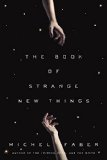Summary | Excerpt | Reading Guide | Reviews | Beyond the Book | Readalikes | Genres & Themes | Author Bio

A Novel
by Michel Faber
"That's a good job. Better than an attorney anyways. Making people's lives better instead of making them worse."
"Well, I hope being a minister achieves the same thing."
"Sure," said the driver breezily. He didn't sound sure at all.
"And what about you?" said Peter. "Are you a USIC . . . uh . . . staff member, or do they just hire you for taxi jobs?"
"Been a driver for USIC for nine, ten years," said the chauffeur. "Goods, mainly. Academics sometimes. USIC holds a lot of conferences. And then every now and then, there's an astronaut."
Peter nodded. For a second he imagined the driver picking up an astronaut from Orlando Airport, pictured a square-jawed hulk in a bulbous space suit lumbering through the arrivals hall toward the placard-wielding chauffeur. Then he twigged.
"I've never thought of myself as an astronaut," he said. "It's an old-fashioned word," conceded the chauffeur. "I use it out of respect for tradition, I guess. The world changes too fast. You take your eyes off something that's always been there, and the next minute it's just a memory."
Peter looked out the window. The motorway looked much the same as a motorway in the UK, but there were giant metal signs informing him that splendid attractions like the Econlockhatchee River and the Hal Scott Regional Nature Preserve were somewhere nearby, hidden beyond the windbreaks. Stylized illustrations on billboards evoked the joys of camping and horseback riding.
"One of the good things about USIC," said the driver, "is that they have some respect for tradition. Or maybe they just recognize the value of a brand. They bought Cape Canaveral, you know that? They own the whole place. Must have cost them a fortune, and they could've built their launch site somewhere else, there's so much real estate up for grabs these days. But they wanted Cape Canaveral. I call that class."
Peter made a vague noise of agreement. The classiness—or otherwise— of multinational corporations was not a subject on which he had strong opinions. One of the few things he knew about USIC was that it owned lots of formerly defunct factories in formerly destitute towns in sloughed-off parts of the former Soviet Union. He somehow doubted that "classy" was the right word for what went on there. As for Cape Canaveral, the history of space travel had never been of the slightest interest to him, even as a kid. He'd not even noticed that NASA had ceased to exist. It was the sort of nugget of useless information that Beatrice was liable to unearth while reading the newspapers that would later be put underneath Joshua's food bowls.
He missed Joshua already. Beatrice often left for work at dawn, when Joshua was still fast asleep on the bed. Even if he stirred and meowed, she would hurry off and say, "Daddy will feed you." And sure enough, an hour or two later, Peter would be sitting in the kitchen, munching sweet cereal, while Joshua munched savory cereal on the floor nearby. Then Joshua would jump on the kitchen table and lick the milk dregs from Peter's bowl. Not something he was allowed to do when Mummy was around.
"The training is tough, am I right?" said the chauffeur.
Peter sensed he was expected to tell stories of military-style exercise regimens, Olympic tests of endurance. He had no such tales to tell. "There's a physical," he conceded. "But most of the screening is . . . questions."
"Yeah?" said the driver. A few moments later, he switched on the car radio. ". . . continues in Pakistan," an earnest voice began, "as anti-government forces . . ." The chauffeur switched to a music station, and the vintage sounds of A Flock of Seagulls warbled out.
Peter leaned back and recalled some of the questions in his screening interviews. These sessions, held in a boardroom on the tenth floor of a swanky London hotel, had gone on for hours at a time. One American woman was a constant presence: an elegant, tiny anorexic, who carried herself like a famous choreographer or retired ballet dancer. Bright-eyed and nasal-voiced, she nursed glass mugs of decaffeinated coffee as she worked, aided by a changeable team of other interrogators. "Interrogators" was the wrong word, perhaps, since everyone was friendly and there was an odd sense that they were rooting for him to succeed.
Excerpted from The Book of Strange New Things by Michel Faber. Copyright © 2014 by Michel Faber. Excerpted by permission of Hogarth Books. All rights reserved. No part of this excerpt may be reproduced or reprinted without permission in writing from the publisher.
Your guide toexceptional books
BookBrowse seeks out and recommends the best in contemporary fiction and nonfiction—books that not only engage and entertain but also deepen our understanding of ourselves and the world around us.